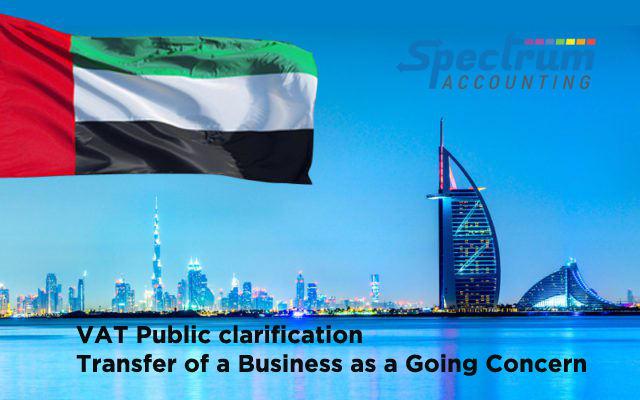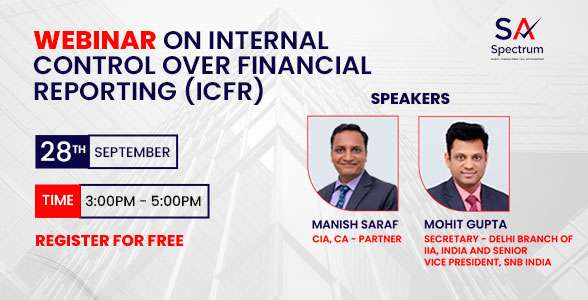VAT Public Clarification
Transfer of a Business as a Going Concern
This Public Clarification discusses the conditions that have to be met for a transfer to qualify as a transfer of a going concern under Article 7(2) of the Decree-Law
In accordance with Article 7(2) of the Federal Decree-Law No. (8) of 2017 on Value Added Tax (the “Decree-Law”), the transfer of whole or an independent part of a business from a person to a taxable person for the purposes of continuing the business that was transferred is not considered to be a supply for VAT purposes.
As a consequence of not being a “supply” for VAT purposes, such transfer of a business, commonly known as a “transfer of business as a going concern” or a “TOGC”, is not subject to VAT. This rule has a compulsory application.
Detailed discussion:
Share sale vs Assets sale
A company can be bought and sold by transferring shares of that company. The company itself is not involved in the transaction and therefore such a transfer of shares does not give rise to any changes in the business operations of the company – it still retains all its assets, liabilities, licences, employees and relationships. The new owner takes over the purchased company with all of its assets and liabilities – including any existing tax obligations of the company.
In contrast, a transfer of assets (including a transfer of goodwill or trading licences) involves a transfer of title in the assets from one person to another person. In this kind of asset sale transaction, there is no change in the ownership of the entities involved in the transaction, and the purchaser does not take on liabilities that are not expressly part of the transaction or that are attached to the purchased asset.
A transfer of business as a going concern is a type of an asset sale, not a share sale. This is discussed in more detail below.
Sale of assets vs sale of business:
For VAT purposes, it is important to distinguish between a normal sale of assets and a sale of assets as part of TOGC.
Normally, a sale of assets by a taxable person is treated as a taxable supply subject to VAT at the appropriate rate. In some limited situations – for example, where there is a sale of bare land or residential property – the supply may be exempt for VAT purposes.
In contrast, where assets are sold as part of a transfer of a business as a going concern, the transfer is not a supply at all and therefore no VAT is charged. This treatment applies to a transfer of the business irrespective of the VAT treatment which would apply to any of the underlying assets that are being transferred.
For example, a manufacturer selling its factory building on its own is a supply of a good and is subject to VAT at 5%. On the other hand, the manufacturer selling the factory building together with manufacturing equipment, and employment and supply contracts may be a transfer of business as a going concern, and therefore not a supply for VAT purposes.
Requirements for a TOGC:
For a transfer not to be treated as a supply for VAT purposes, the following conditions must be met:
-
There must be a transfer of whole or an independent part of a business;
-
The transfer must be made to a taxable person; and
-
The recipient intends to continue the business which was transferred.
Transfer of the whole or an independent part of a business:
Article 1 of the Decree-Law defines “business” as:
“Any activity conducted regularly, on an ongoing basis and independently by any Person, in any location, such as industrial, commercial, agricultural, professional, service or excavation activities or anything related to the use of tangible or intangible property.”
For a transfer to be subject to Article 7 of the Decree-Law, there must be a transfer of a business, and a mere transfer of assets will not qualify as a TOGC.
As such, the transfer must effectively give the recipient the possession of the whole of a business, or part of a business where that part is capable of separate operation. As part of the transfer, all of the goods and services that are necessary for the continued operation of that business or a part of a business must be supplied to the recipient. Depending on the facts, this may include, among other things, goodwill, licences, premises, machinery and equipment, employees, ongoing contracts, and liabilities.
To qualify as a going concern, the transferred business must be operational before and at the time of transfer.
As a consequence, where there is an agreement to transfer a business which is yet to commence, there will be no transfer of a business as a going concern since there is no transferred business which is yet capable of being continued by the transferee.
Similarly, where the business has ceased operation before the transfer date, the transfer will not qualify as a TOGC.
The transfer must be made to a taxable person:
For a TOGC to take place, the recipient must be a taxable person at the time of transfer – i.e. the recipient should be registered or obligated to register for VAT. This condition will be met if any of the following is in effect on the date of transfer:
-
The recipient is registered for VAT;
-
The recipient is required to be registered under the mandatory registration rules and has applied for registration to the FTA; or
-
The recipient has applied for voluntary VAT registration and the FTA has accepted the application.
It should be noted that there is no requirement for the supplier to be registered for VAT for a TOGC to take place. Where the supplier is trading under the mandatory VAT registration threshold, the transfer of a business as a going concern will not affect the supplier’s registration requirements since it would not be a supply for VAT purposes.
The transfer of a business as a going concern does not relieve the supplier from its tax obligations incurred during its ownership of the business and the underlying assets. For example, where the supplier has incorrectly omitted to register for VAT and charge VAT on its supplies during its ownership of the business, the supplier will remain liable to the FTA in respect of these violations.
The recipient intends to continue the business which was transferred:
The final condition in Article 7(2) of the Decree-Law requires that the transfer of the whole or independent part of the business must be for the “purposes of continuing the business which was transferred”.
This requirement will be met as long as the recipient of the business intends to carry on the same kind of business which it acquires. For example, if the recipient acquires a property with a leasing business, the condition will be met if the recipient intends to continue carrying out the leasing business on the property.
In contrast, the condition will not be met if the recipient has fundamentally changed, or did not use, the business after acquiring it. For example, it would not be the same kind of business if the recipient acquires the property leasing business but intends to use the purchased property as their own headquarters.
For the purposes of a TOGC, it is irrelevant whether the new owner will operate the transferred business separately from, or as part of, any other businesses that he is already operating.
Although there is no requirement for the minimum period for which the transferred business must be operational under the recipient’s ownership, the intention to continue the business must be genuine.
A short period of temporary closure of the business immediately after the transfer is permissible if it is necessary to prepare the business for operation under the new ownership.
Proof of intention:
As discussed above, for a TOGC to take place, the recipient must intend to continue the business which was transferred. As a consequence, prior to treating the transfer as a non-supply under Article 7(2) of the Decree-Law, the supplier should satisfy themselves that the recipient intends to continue the business as a going concern.
Where the supply has been incorrectly treated as a TOGC, VAT may be retrospectively due on the supply. The parties should consider the potential consequences of any such errors when entering into contractual arrangements.



 contact us
contact us